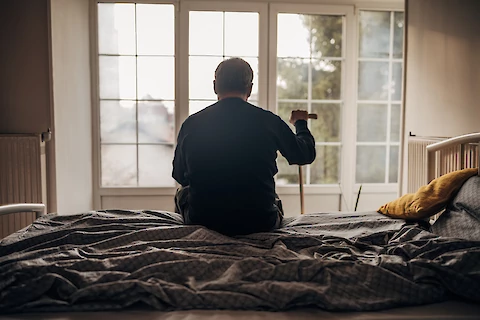
Depression in seniors is a common concern. It can vastly affect the quality of life for seniors and may go unnoticed by family members and caregivers. That's why it's essential to understand this mental health issue, its symptoms, risk factors, and possible triggers.
This article from Senior Helpers Warren will provide an informative guide to help you better support your senior loved ones, ensuring they get the care they deserve. If you're a caregiver, family member, or friend, knowing how to recognize and deal with depression in seniors can help you improve and enhance their overall well-being.
Symptoms of Depression in Seniors
Depression in seniors can show up in different ways. Emotional symptoms may include constant sadness or emptiness, hopelessness, and irritability. Physical symptoms may include appetite changes, sleep problems, or unexplained tiredness. Seniors with depression may also have cognitive symptoms like trouble concentrating, memory issues, or indecision. Finally, social symptoms might include avoiding social activities or losing interest in hobbies that used to make them happy.
Risk Factors for Depression in Seniors
Knowing the risk factors for depression in seniors can help you pinpoint who might be more likely to have this mental health problem. Biological factors like genetics and chemical imbalances in the brain may be involved.
Psychological factors such as certain personality traits, coping skills, or a history of depression can also play a part. Social factors, like isolation or not having support, are especially important to look out for. Health factors such as chronic illnesses or specific medications can also raise the risk. Furthermore, life events like retiring or losing a loved one may cause depression in seniors.
Potential Triggers of Depression in Seniors
Depression in seniors can be triggered by grief and loss, health problems or constant pain, loneliness or social isolation, money stress, or changes in living situations. For example, losing a spouse or close friend can lead to sadness and depression. Similarly, constant pain or health problems can lead to emotional pain, while isolation can worsen feelings of loneliness.
Financial worries and changes in living situations like moving to a new home or assisted living facility can also create depressive symptoms.
Tips for Helping Seniors Manage Their Mental Health
As a caregiver or family member, there are some ways you can support a senior's mental health. Encourage them to talk openly and listen actively to help your loved one share their feelings. Offer emotional support and reassurance to help them handle their emotions.
You can also help seniors stay connected with others and take part in fun activities, which are essential for their emotional well-being. Encourage them to eat healthy foods to improve overall health. Help them manage medications and go to medical appointments to make sure they get proper treatment for any health problems.
When to Seek Professional Help
If your loved one has suicidal thoughts, severe symptoms, or can't handle their emotions, it might be time to get help from a mental health professional. Psychiatrists, psychologists, and therapists are all trained to help people manage depression and other mental health issues. To find a qualified professional in your area, try to search online directories or ask medical professionals for recommendations.
Senior Helpers Provides Support and Care
By recognizing the symptoms, risk factors, and possible triggers, you can actively support your senior loved ones' mental health. If you or a loved one needs help with in-home senior care solutions, then contact Senior Helpers. We provide personalized senior care to adults in and around the Erie, Warren, Millcreek, Fairview, West County, Harborcreek, Bear Lake, Chandlers Valley, and Clarendon areas.